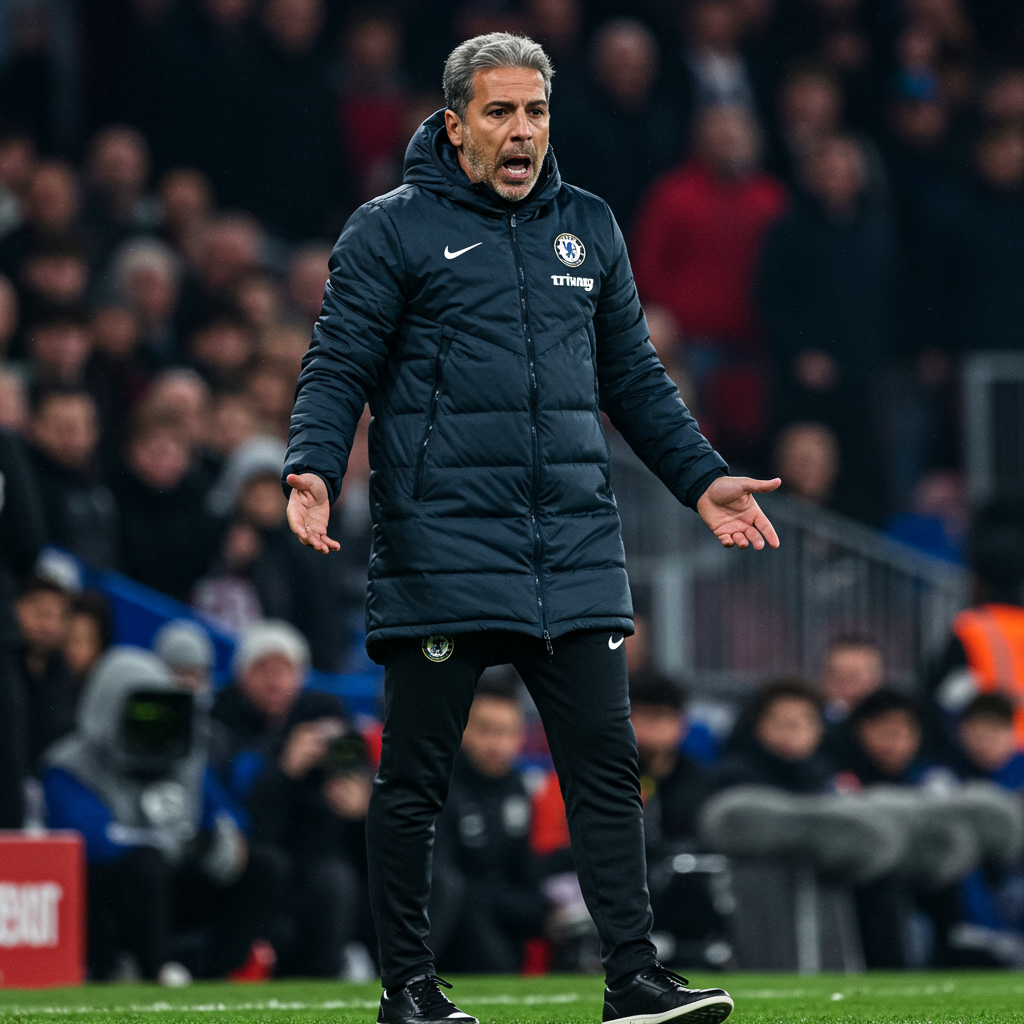Chelsea manager Enzo Maresca has launched a scathing attack on the organizers of the FIFA Club world Cup being held in the United States, branding the frequent and lengthy weather delays a “joke.” His strong remarks followed a near two-hour suspension of his team’s round-of-16 tie against Benfica in Charlotte, North Carolina. Maresca questioned the suitability of the US as a host nation for a major tournament during the summer months, declaring the disruptive stoppages were “not football.”
The incident occurred in the 85th minute of Chelsea’s match, with the team holding a 1-0 lead. Despite no rain falling at that moment, play was halted due to US safety regulations detecting lightning risk within an eight-mile radius. What followed was a staggering 113-minute delay. This wasn’t an isolated event; reports confirmed it was the sixth storm-enforced interruption and the third exceeding an hour in the tournament so far.
“It’s Not Football”: Maresca’s Frustration Boils Over
Speaking after Chelsea’s eventual 4-1 extra-time victory, achieved after a match that spanned four hours and 39 minutes and finished well past midnight BST, Maresca didn’t mince words. “I think it’s a joke, to be honest,” he stated. “It’s not football. It’s completely something new; I struggle to understand.” While acknowledging that security reasons for suspensions are understandable, the sheer frequency was the issue. “If you suspend seven or eight games then it’s probably not the right place to do the competition,” he argued.
Maresca drew a sharp contrast with major international competitions. “In a World Cup, how many games are suspended? Zero probably. In Europe how many games get suspended? Zero,” he noted. He highlighted that within just two weeks, the Club World Cup had seen numerous significant pauses. “We’ve been here two weeks and they’ve already suspended six or seven games. There is some problems for me personally.” His criticism, he clarified, was directed purely at the logistical challenges posed by the weather, not the competition itself. He found the Club World Cup a “fantastic competition.”
The Disruption On and Off the Pitch
The Chelsea manager detailed the profound negative impact of the two-hour break on his players. He felt it was impossible to maintain focus and competitive intensity during such a prolonged stoppage. Players were observed talking to family, eating, laughing, and using their phones in the dressing room and operations area. “So two hours inside… people eating, laughing, talking on their mobiles. It was two hours. That’s why I said it’s not football,” Maresca explained.
Before the suspension, Chelsea had been in control of the game. They were leading 1-0 and hadn’t conceded. However, after the restart, the dynamic shifted dramatically. Benfica were awarded a penalty deep into stoppage time and equalized, forcing the game into extra time. Reece James, scorer of Chelsea’s initial goal, echoed Maresca’s sentiments, calling the delay “quite disruptive when you’re in the flow of the game.” He added that it was difficult trying to get warm and stay warm in the hot and humid climate. Even defender Trevoh Chalobah saw the humor in the situation, posting that the “Game started Saturday and ended Sunday.” A senior Chelsea official admitted to confusion and relief after the lengthy ordeal.
A Pattern of Delays Across US Cities
The Chelsea-Benfica incident is far from unique in this tournament. Benfica themselves had previously experienced a two-hour delay to the start of their match against Auckland City in Orlando. Other significant stoppages have included:
Ulsan vs. Mamelodi Sundowns in Orlando, Florida (exceeding an hour).
Red Bull Salzburg vs. Pachuca in Cincinnati, Ohio (97 minutes).
Palmeiras vs. Al Ahly at MetLife Stadium in East Rutherford, New Jersey (brief suspension amid heat and storms).
Auckland City vs. Boca Juniors in Nashville, Tennessee (40 minutes).
Beyond thunderstorms, extreme heat has also plagued the tournament. Maresca stated it was “impossible” to conduct a normal training session at Chelsea’s previous base in Philadelphia due to soaring temperatures.
Looking Ahead: Concerns for the 2026 World Cup
The prevalence of these weather issues during the US summer raises significant concerns ahead of the 2026 World Cup, which the US will co-host with Canada and Mexico, primarily during the summer months. While some major stadiums selected for 2026 have retractable or covered roofs (like Atlanta, Vancouver, Dallas, Houston, Los Angeles, and Toronto), many Club World Cup venues did not. Bank of America Stadium in Charlotte, for instance, has an open design.
Experts from the National Weather Service have confirmed that frequent thunderstorms are “very typical” for this time of year, especially in the eastern half of the US. This suggests similar weather patterns could potentially impact the 2026 World Cup. Notably, only one of the cities heavily affected by delays in the Club World Cup so far (MetLife Stadium in New Jersey, which will host the final) is also a World Cup host city. However, the sheer number of widespread incidents during the Club World Cup serves as a stark warning.
Head of Fifa’s technical study group, Arsene Wenger, addressed the stoppages, acknowledging they are “not ideal” but stressed that prioritizing security is paramount when organizing competitions. FIFA’s official statement on the Chelsea-Benfica delay echoed this, citing “adverse weather conditions” and “established safety protocols.”
While FIFA’s technical evaluation for the 2026 bids noted high average peak temperatures in many proposed US cities, the issue of the summer tournament calendar itself wasn’t questioned in the same way it was for the 2022 Qatar World Cup, which was moved to winter. This discrepancy highlights the potential challenges organizers may face in 2026 if extensive delays become commonplace during a much larger, higher-profile tournament. The contrast between FIFA’s messaging about the Club World Cup’s importance and the reality of games being severely disrupted undermines its credibility.
Frequently Asked Questions
Why are there so many weather delays at the Club World Cup in the US?
The high frequency of delays is primarily due to seasonal summer thunderstorms, which are common across many parts of the United States, particularly in the eastern half. US safety regulations require suspending play when lightning is detected within a specific radius of the venue, leading to lengthy stoppages like the two-hour delay in the Chelsea-Benfica match.
Which other games in the tournament have been affected by delays?
Beyond the Chelsea-Benfica tie, several other matches have experienced significant weather suspensions. These include delays in games like Benfica vs. Auckland City (a two-hour delay), Ulsan vs. Mamelodi Sundowns, Red Bull Salzburg vs. Pachuca (97 minutes), Palmeiras vs. Al Ahly, and Auckland City vs. Boca Juniors (40 minutes). These incidents have occurred in multiple US cities hosting the tournament.
How might these frequent delays impact the 2026 World Cup?
The extensive weather delays witnessed at the Club World Cup, held in the US during summer, raise concerns for the 2026 World Cup, which will also be primarily hosted in the US (along with Canada and Mexico) during the summer months. While some 2026 stadiums have covered roofs, many do not. The typical summer thunderstorm patterns could lead to similar disruptions in 2026, potentially affecting player performance, fan experience, and the tournament schedule, despite FIFA’s focus on security protocols.
Conclusion
Enzo Maresca’s blunt assessment of the Club World Cup weather delays highlights a significant challenge facing major football tournaments held in the United States during the summer. While player safety is paramount, the repeated, prolonged stoppages fundamentally disrupt the flow and competitive integrity of the game, making it feel like “not football,” as Maresca put it. With the 2026 World Cup just two years away, hosted in the same summer window, the experiences from this Club World Cup serve as a critical warning. Organizers will need robust strategies, potentially involving scheduling adjustments or maximizing the use of stadiums with retractable roofs, to mitigate the impact of predictable summer weather patterns and ensure the world’s biggest football tournament doesn’t become known for frustrating, unpredictable delays.
Word Count Check: 1072



